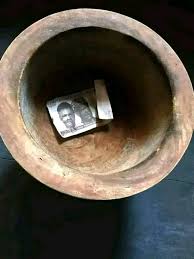Travel
Spiritual Effects Of Traveling with an Empty Mortar Without Money Inside It

In the age-old quest for spiritual enlightenment, individuals have embarked on countless journeys, seeking meaning, purpose, and connection to something greater than themselves. Throughout history, various practices and rituals have emerged as pathways to transcendence, each offering its own unique insights and revelations.
One such practice, lesser-known yet profound in its implications, involves traveling with a mortar—typically associated with grinding substances—devoid of any monetary contents. While it may seem enigmatic or even bizarre at first glance, this practice holds deep spiritual significance for those who dare to explore its depths.
The mortar, traditionally used for crushing grains or herbs, becomes a vessel not for material wealth, but for the intangible riches of the soul. By embarking on a journey with an empty mortar, practitioners relinquish the burdens of material possessions and embrace a state of spiritual purity and openness.
At its core, this practice challenges conventional notions of value and abundance. In a world consumed by consumerism and the relentless pursuit of wealth, traveling with an empty mortar serves as a poignant reminder of the transient nature of material possessions. It encourages individuals to shift their focus from external acquisitions to internal growth and fulfillment.
But beyond its symbolic significance, traveling with an empty mortar holds profound spiritual effects for those who engage in the practice. As one navigates unfamiliar landscapes and encounters diverse cultures, the empty mortar becomes a catalyst for introspection and self-discovery.
Without the distraction of material concerns, practitioners are free to immerse themselves fully in the present moment, cultivating a deep sense of mindfulness and awareness. They become attuned to the subtle rhythms of life, finding beauty and meaning in the simplest of experiences.
Moreover, traveling with an empty mortar fosters a profound sense of humility and interconnectedness. In acknowledging their own vulnerability and reliance on the kindness of others, practitioners develop a deep appreciation for the generosity and compassion that exists within humanity.
Through encounters with strangers who offer food, shelter, or companionship without expectation of reciprocation, travelers come to recognize the inherent goodness that permeates the world. They realize that true wealth lies not in material possessions, but in the richness of human connection and the boundless capacity for love and generosity.
Furthermore, the practice of traveling with an empty mortar can lead to profound spiritual insights and revelations. In moments of solitude and reflection, practitioners may experience profound shifts in consciousness, gaining clarity and perspective on their life’s purpose and direction.
As they traverse the physical landscape, they embark on an inner journey of transformation and growth, shedding layers of ego and attachment to uncover the essence of their true selves. In this process of self-discovery, they may come to realize that the ultimate fulfillment lies not in the accumulation of wealth or possessions, but in the journey itself—the ceaseless quest for understanding, connection, and enlightenment.
